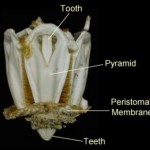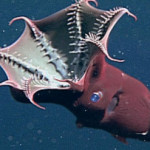
On April 24, 1895, Nova Scotian Joshua Slocum set sail from Boston harbor on Spray, an 11 meter long sloop. He was the first to solo circumnavigate all 74,000 kilometers (46,000 miles) of the globe, accomplished without the use of stellar navigation by dead reckoning. Slocum’s name continues to inspire and can be seen adorning ships and ferries, monuments and memorials and even a new underwater glider.
 With the potential to travel 2000 meters depth over a distance of 40,000 kilometers, the Slocum Glider developed by the Webb Research Corporation is the new bloodhound of the sea, an oceanographer’s best friend. It glides through the currents, much like a hang-glider in air, for up to 5 years at a not-so-record-breaking 1.6 kilometers per hour by harnessing the ocean’s thermal power.
With the potential to travel 2000 meters depth over a distance of 40,000 kilometers, the Slocum Glider developed by the Webb Research Corporation is the new bloodhound of the sea, an oceanographer’s best friend. It glides through the currents, much like a hang-glider in air, for up to 5 years at a not-so-record-breaking 1.6 kilometers per hour by harnessing the ocean’s thermal power.
“Traditionally, gliders use battery-powered motors and mechanical pumps to move ballast water or oil from inside the vehicle to a bladder on the vehicle’s exterior. This changes its volume and buoyancy without changing its mass, causing it to sink or rise while at the same time pushing it forward.
The researchers say the same principle is at work, only their thermal glider gets its energy from the heat of the ocean. Warmer water closer to the surface warms wax-filled tubes inside the engine, which expand to push oil from the interior to the exterior of the glider. As the glider dives and reaches deeper, colder waters, the wax cools and contracts, bringing the oil back to the interior.”
On March 7, researchers launched Slocum from Rutgers University in New Jersey where it made the 2,600 kilometer journey up the Gulf Stream to Halifax, Canada in just 52 days. The Chronicle Herald Metro, reports in today’s edition that the Slocum Glider is hailed by oceanographers as the “future of oceanography”. During its journey to Canada the glider collected “invaluable” data on temperature, depth and waves. It can also be outfitted with sensors that can help scientists studying weather, climate change and fisheries.
Below the fold is a video of it “in action”…





